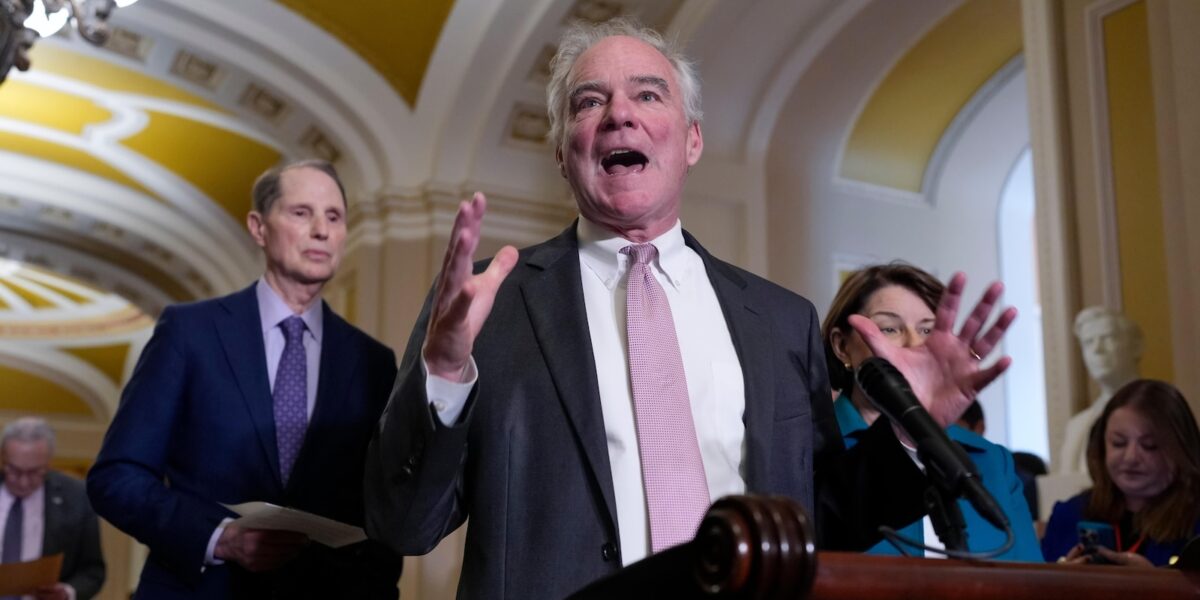WASHINGTON — Senate Republicans are facing pressure Wednesday from President Donald Trump to oppose a Democratic resolution that would nullify the presidential emergency on fentanyl he is using to implement tariffs on Canada.
Just hours before Trump was set to announce his plan for “reciprocal tariffs” on China, Mexico and Canada — his so-called “Liberation Day” — the Senate was expected to vote on a resolution that offers Republicans an off-ramp to the import taxes on Canada. It is a significant test for Republican loyalty to Trump’s vision of remaking the U.S. economy by clamping down on free trade. Many economists are warning that the plan could force an economic contraction, and GOP senators are already watching with unease.
The votes of at least four Republicans — Sens. Lisa Murkowski of Alaska, Susan Collins of Maine, Mitch McConnell of Kentucky and Rand Paul of Kentucky — were in doubt ahead of the vote. If all Democrats plus the four Republicans vote for the resolution, it would boost it to the simple majority needed to pass the Senate. The legislation would still need to be brought up and passed in the Republican-controlled House.
In a social media post just before 1 a.m. Wednesday, Trump singled out the four senators, saying they “will hopefully get on the Republican bandwagon, for a change, and fight the Democrats wild and flagrant push to not penalize Canada for the sale, into our Country, of large amounts of Fentanyl.”
To justify the tariffs, Trump has argued that Canada is not doing enough to stop illegal drugs from entering the northern border. Customs and Border Protection seized 43 pounds of fentanyl at the northern border during the 2024 fiscal year, and since January, authorities have seized less than 1.5 pounds, according to federal data. Meanwhile, at the southern border, authorities seized over 21,000 pounds last year.
Sen. Tim Kaine, the Virginia Democrat who initiated the resolution, said at at news conference Tuesday that Trump was inventing a “made-up emergency” to help pay for extending tax cuts that he argued would mostly benefit the wealthy.
“How are they going to pay for it? Massive cuts in programs like Medicaid and Medicare, and tariffs imposed on the backs of everyday Americans,” Kaine said.
Democrats were highlighting how the tariffs on Canada could make it more expensive to build homes, disrupt industries like shipbuilding and beer brewing and raise prices on imported grocery products.
“Today, Donald Trump takes a sledgehammer to the American economy and even to the American dream,” Senate Democratic leader Chuck Schumer said in a floor speech. He added, “The Senate has a chance to slow this trade war down today if Republicans join us.”
For their part, Republican leaders were trying to hold their members in line against the tariff resolution by emphasizing that Trump was acting to address fentanyl trafficking and border security.
Majority Whip Sen. John Barrasso claimed in a floor speech that former President Joe Biden had “also thrown open the northern border. The criminal cartels noticed and they took advantage.”
“There are unique threats to the United States at our northern border,” the Wyoming senator said. “President Trump is taking the bold, decisive, swift, swift action that is necessary to secure that border as well.”
However, a key group of Senate Republicans are worried about the economic impacts from the tariffs on Canada. Collins noted that already “Canada is beefing up its security on the border” to address drug trafficking and said she was concerned what tariffs would do to businesses and households in Maine.
“We have a paper mill in northern Maine that gets its pulp from Canada. It’s pumped across the river and then made into paper. That mill employs 510 people. It’s going to be in trouble if there’s a tariff of 25% put on pulp,” Collins said.
Still, other Republicans noted their concerns about the tariff impacts on farmers and other industries, but still wanted to give Trump room to negotiate better trade deals.
North Dakota Sen. Kevin Cramer said that he has been in constant talks with both Canadian officials and businesses in his state like Bobcat, which does a significant amount of its sales in Canada. But he didn’t plan on supporting the resolution. Instead, he hoped that Trump’s Wednesday announcement would just be a starting point for negotiations for the reciprocal dropping of tariffs.
The Republican added: “I’m not overly concerned about it, but obviously it occupies a lot of attention and time and a lot of political anxiety.”


